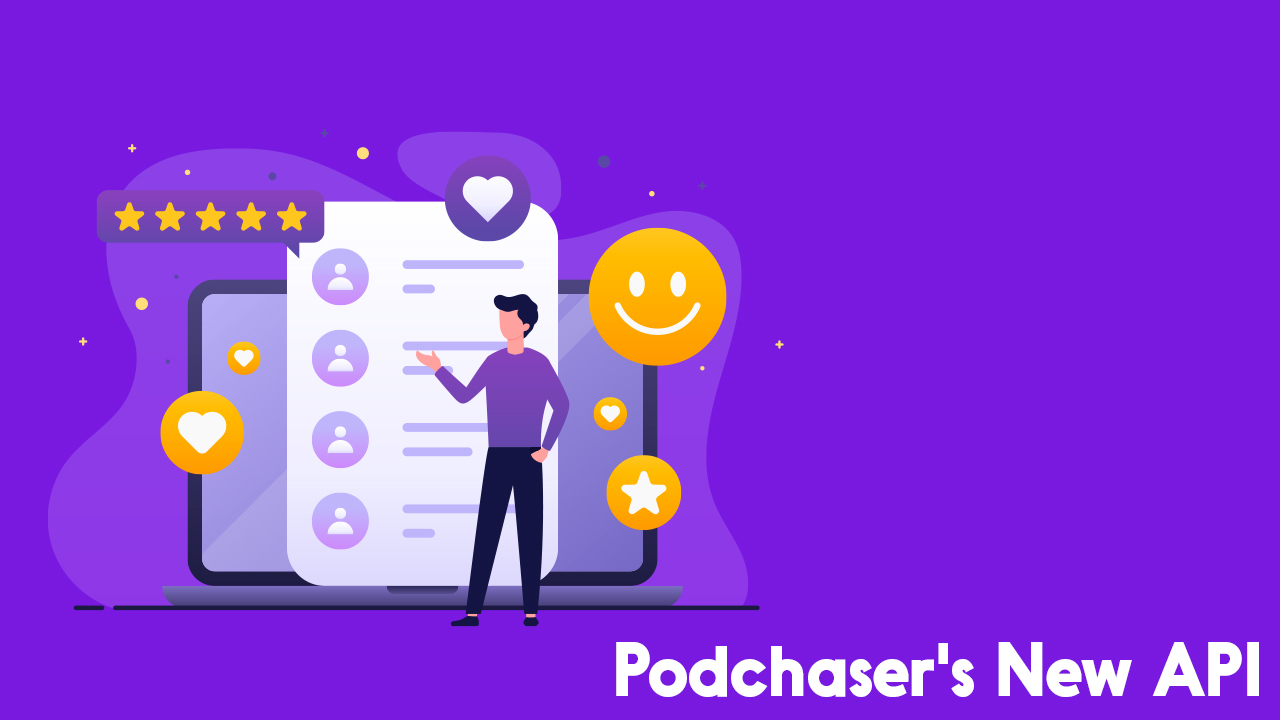Podchaser’s New API Sparks Listening App Development With More User Input Than The Competition

Podchaser recently announced that they have created a new API. Built with discovery in mind, the press release states that app developers can now take advantage of this technology for free. “Our platform goes beyond the RSS feed to deliver an incomparable set of metadata you can’t find anywhere else, making it the perfect API for podcast search and discovery.” Let’s take a closer look at this information about Podchaser’s new API, and figure out what it means for podcasters and listeners.
What Does This Mean?
API stands for Application Programming Interface. I’m a writer, not a developer, so I asked my co-worker, Sean, to explain it to me. He said, “Think of an API as something that allows pieces of software to communicate with each other. For example, Alitu communicates with Captivate through the Captivate API, which allows users to publish their episode with Captivate, but from Alitu.”
When you use a listening app to hear a podcast, the app pulls the episode via an API. Some, such as Apple or Spotify, use their own API to deliver the episode in their own directories. Others, such as Overcast, use Apple’s API to pull it from Apple’s directory. Podchaser’s new API means that listening apps can pull episodes from Podchaser’s directory. This includes Podchaser’s metadata, such as ratings and reviews.
What Does Podchaser’s New API Mean for Podcasters?
Podchaser “tracks podcasts across multiple feed sources to ensure the most up-to-date podcast database out there.” It doesn’t seem that podcast producers need to submit RSS feeds directly to Podchaser. No extra work for you (as far as I can tell).
Apple and Spotify display listening choices in order of popularity. Podchaser displays listening choices according to the user’s interest by default (it’s optional to view listening choices by popularity). This involves a little more work on the user’s part. The result is an experience that fits users, and they will commit to it in the long run.
Podchaser also says that their “roster of over 11 million creator and guest credits” means it’s easier for listeners to find shows they care about. This could mean that you can have more dynamic and useful show notes.
Through Podchaser’s new API, your podcast isn’t buried under hundreds of other shows. People already interested in podcasts like yours will have an easier time finding it.
What Does Podchaser’s New API Mean for Listeners?
Podchaser’s user experience is less about ranking, and more about preference. They encourage users to follow podcasts and other Podchaser users, share reviews, and make lists of shows. Users could make lists of “my kids’ favorite shows,” or “research for my phD.” Anything, really.
Podchaser’s API includes lists, ratings, reviews, listen tracking and bookmarking. So, if listening app developers include these in the app design, it makes a more interactive user experience. There’s so much more information for an app developer to use, to make podcast listening fun, instead of ranked.
What Does Podchaser’s New API Mean for The Podcast Landscape?
In my opinion, this is going to compromise Apple’s dominance over the podcast zeitgeist.
In case you missed it, Apple’s paid podcast launch moved from May to June. Additionally, Apple admits podcast creators have experienced “delays in the availability of their content and access to Apple Podcasts Connect.”
Podchaser reported more specifics about user problems with Apple.
Spotify probably cares more about their exclusive content than anything Podchaser does.
I asked Colin what he thought. He said that stats show many podcasters choose not to bother listing their shows in Apple’s directory. “It’s possible that Podchaser and The Podcast Index could be a more complete directory of the podcast ecosystem.”
Essentially, Podchaser’s new API means app developers can make listening apps that better meet users’ interests. This can help listeners have wider, more interesting selection options, and podcasters can find new ways to engage with audiences.
Recently, AppleVis (a community for blind and low vision Apple users) inducted Overcast into their iOS Hall of Fame, for the app’s excellence in accessibility. It’s the only podcast listening app in the Apple Vis Hall of Fame, other than Audible. If Overcast were to switch from using Apple’s API to using Podchaser’s new API, this could cause a seismic shift in how listeners consume and share podcasts.
In the meantime, the more feedback that audiences provide for podcasters, the better the podcast ecosystem will be for all of us.
